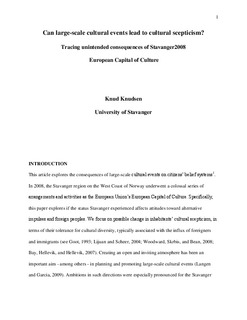| dc.contributor.author | Knudsen, Knud | |
| dc.date.accessioned | 2011-04-27T11:22:15Z | |
| dc.date.available | 2011-04-27T11:22:15Z | |
| dc.date.issued | 2010 | |
| dc.identifier.citation | Can large-scale cultural events lead to cultural scepticism? Tracing unintended consequences of Stavanger2008 European Capital of Culture. I: Nordisk kulturpolitisk tidsskrift 13(2010)1, 44-58 | en_US |
| dc.identifier.issn | 1403-3216 | |
| dc.identifier.uri | http://hdl.handle.net/11250/184289 | |
| dc.description.abstract | Large scale cultural events often have idealistic aims of affecting participants and spectators in a positive manner, by widening public’s cultural understandings and horizons. The ‘Open Port’ motto chosen for the Stavanger-Region as European Capital of Culture in 2008 explicitly signalled such ambitions. This article takes the idea of a positive link between exposure to broad-ranging cultural events and tolerance for cultural diversity as a starting point. Nevertheless, there is seemingly little empirical support in the research literature for such a postulate. On this background we suggest a different line of arguments, based on the idea of relative deprivation. Rather than expecting positive change in the beliefs of those more exposed, this alternative hypothesis presumes that inhabitants away from the main centres of artistic and cultural activities, could react. They will often see themselves as left behind and kept out from the grand events, it is contended. In this way we hypothesise that local inhabitants living outside of the central areas will react negatively, by becoming less sympathetic. Special survey data from the region for the period 2007-2009 indicate empirical support for this alternative hypothesis, based on the idea of relative deprivation. At the same time there is little evidence of a possible link between higher exposure and increased tolerance. Multiple regression analysis with an index of cultural scepticism as the dependent variable, shows basically no change in attitudes for those living close to main centres of Stavanger 2008 activities. At the same time there is a significant increase in cultural scepticism among local inhabitants living farther away from the central axis. Moreover, results from surveys at the national level confirm a picture of stability in cultural scepticism for Norwegians in general during the same period. This makes an explanation of the observed change for inhabitants living within the larger Stavanger-region - but outside the central axis, especially challenging. Although the empirical patterns are consistent with the idea of relative deprivation, these findings could not be regarded as a strong test of the hypothesis at this stage. Further research, in alternative settings and with supplementary measures is needed. | en_US |
| dc.language.iso | eng | en_US |
| dc.publisher | Universitetsforlaget | en_US |
| dc.relation.uri | http://www.idunn.no/ts/nkt/2010/01/art02 | |
| dc.subject | cultural scepticism | en_US |
| dc.subject | cultural openness | en_US |
| dc.title | Can large-scale cultural events lead to cultural scepticism? Tracing unintended consequences of Stavanger2008 European Capital of Culture | en_US |
| dc.type | Journal article | en_US |
| dc.type | Peer reviewed | en_US |
| dc.subject.nsi | VDP::Humanities: 000::Cultural science: 060::Nordic cultural science: 061 | en_US |
| dc.source.pagenumber | pp. 44-58 | en_US |
| dc.source.volume | 13 | |
| dc.source.journal | Nordisk kulturpolitisk tidsskrift | |
| dc.source.issue | 1 | |
